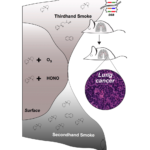The projects of 13 Biosciences Area scientists and engineers received funding through the FY18 Laboratory Directed Research and Development (LDRD) program. These projects span a diverse array of topics and approaches including the study of microbiomes in relation to patterns of mutualism, crop productivity, and gut health; synthetic biology for engineering biosurfactant production and energy conversion pathways; and the application of technologies such as machine learning, high-resolution optical microscopy, and single-cell transcriptomics. Together, these efforts account for 18.75 percent of the $20 million allocated. Lab-wide, 74 projects were selected from a field of 215.
Thirdhand Smoke Found to Increase Lung Cancer Risk in Mice
Cigarette smoke contains myriad compounds that are known mutagens and carcinogens, and the health risks associated with active smoking and secondhand smoke are well established. Nearly 10 years ago, researchers at Berkeley Lab identified another potentially hazardous source of tobacco exposure: “thirdhand smoke,” the toxic residues that linger on indoor surfaces and in dust long after a cigarette has been extinguished. A team led by Antoine Snijders, Jian-Hua Mao, and Bo Hang in Biosciences’ Biological Systems and Engineering (BSE) Division have determined that early thirdhand smoke exposure is also associated with increased incidence and severity of lung cancer in mice.
Thirdhand Smoke Study Gets Renewed Media Attention
Research published earlier this year by Berkeley Lab scientists in Biological Systems and Engineering Division (BSE) showing that exposure to thirdhand smoke was associated with low body weight and immune changes in young mice has recently received a flurry of renewed media attention. Antoine Snijders was interviewed via Skype for a segment that aired on New York’s Fox 5 News. In it, he noted that human infants and toddlers could potentially be at risk of exposure. “They play with toys, they play on carpets, there’s much more hand-to-mouth action than most adults do. So the exposure levels could be significantly higher in that age group,” he said. An article on USAToday.com quoted Bo Hang and Jian-Hua Mao. “We suspected that the young are most vulnerable because of their immature immune systems, but we didn’t have a lot of hard evidence to show that before,” Hang said. The study was also referenced on the blog Bustle which linked to the original Berkeley Lab News Center article.
New Machine Learning Technique Provides Translational Results
A team of scientists has developed an unsupervised multi-scale machine learning technique that can automatically and specifically capture biomedical events or concepts directly from raw data. They have initiated the multi-disciplinary platform: Berkeley Biomedical Data Science Center (BBDS), which aims at facilitating and nurturing data-intensive biomedical science. They will apply this technique to three ongoing projects related to cancer risk assessment and diagnosis, as well as personalized medicine.
Biosciences Area FY17 LDRD Projects
The projects of 13 Biosciences Area scientists and engineers received funding through the FY17 Laboratory Directed Research and Development (LDRD) program. The funded projects cover a broad range of topics including the study of microbiomes in relation to their environment, plants, and gut health; catalysis for solar conversion to energy; and genomic expression in tissue. Among them were three projects related to Lab-wide initiatives. Together, these efforts account for 17.5% of the $25.2 million allocated. Lab-wide, a total of 88 projects were selected from a field of 166 proposals.
Was this page useful?








